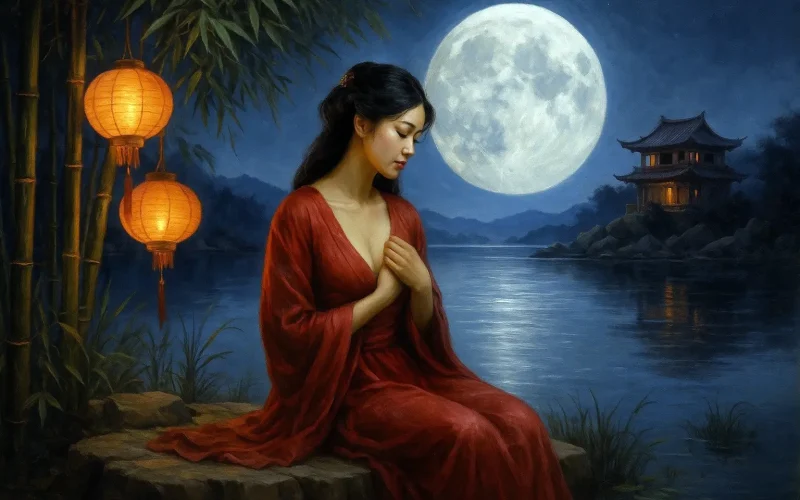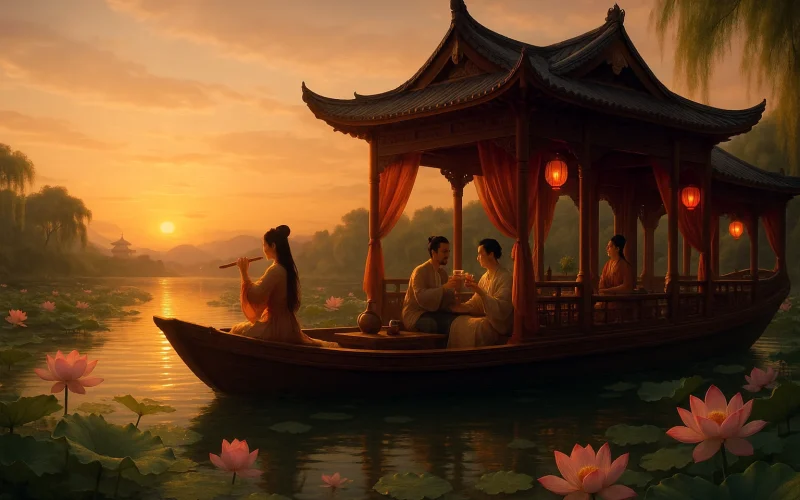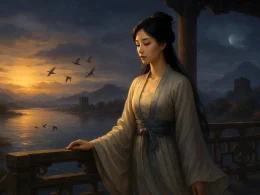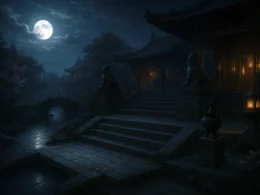Since parting, I know not how far you’ve gone—
Each sight fills me with desolation,
A weight of wordless sorrow.
Farther you drift, no letters come;
Wide waters, diving fish—
To whom can I ask of your whereabouts?
Late night: wind through bamboo taps autumn’s tune,
A thousand leaves, ten thousand whispers—
All humming with regret.
I tilt the lonely pillow, seeking you in dreams,
But dreams won’t come—
And the lamp burns to ash.
Original Poem
「玉楼春 · 别后不知君远近」
欧阳修
别后不知君远近,触目凄凉多少闷。
渐行渐远渐无书,水阔鱼沉何处问。
夜深风竹敲秋韵,万叶千声皆是恨。
故攲单枕梦中寻,梦又不成灯又烬。
Interpretation
Believed to be an early work of Ouyang Xiu, this lyric adopts the persona of a lovelorn woman, articulating post-separation anguish. While renowned as a Northern Song literary master, Ouyang's ci poetry uniquely blends scholarly refinement with boudoir plaintiveness. Composed during his formative years, the piece shows clear influences from Five Dynasties "Flower and Willow" style while transcending its superficial depictions to achieve profound psychological depth—marking Ouyang's innovative contribution to the genre.
First Stanza: "别后不知君远近,触目凄凉多少闷。渐行渐远渐无书,水阔鱼沉何处问。"
Bié hòu bù zhī jūn yuǎn jìn, chù mù qī liáng duō shǎo mèn. Jiàn xíng jiàn yuǎn jiàn wú shū, shuǐ kuò yú chén hé chù wèn.
Since parting, unaware how far you roam,
Each sight breeds desolation's gnawing ache.
Farther you drift, more letters cease to come—
Where in vast waters might sunk fish awake?
The stanza's emotional architecture builds through triple repetition of "gradually" (渐), mapping emotional erosion onto physical distance. The "sunken fish" (鱼沉) metaphor—alluding to lost letters in classical imagery—transforms geographical separation into existential silence, where even nature's messengers (fish as ancient postal symbols) fail.
Second Stanza: "夜深风竹敲秋韵,万叶千声皆是恨。故攲单枕梦中寻,梦又不成灯又烬。"
Yè shēn fēng zhú qiāo qiū yùn, wàn yè qiān shēng jiē shì hèn. Gù qī dān zhěn mèng zhōng xún, mèng yòu bù chéng dēng yòu jìn.
Night deepens—wind through bamboo taps autumn's tune,
Each rustling leaf voices my curse.
I tilt my solitary pillow, seeking you in swoon,
But dreams dissolve as lamp dies worse.
Nature becomes an amplification of inner torment: the onomatopoeic "tapping" (敲) of bamboo leaves morphs into countless audible grievances (万叶千声). The couplet's devastating parallelism—failed dreams mirroring extinguished lamps—creates a double annihilation of hope, where both psychological refuge (dreams) and physical anchor (light) vanish simultaneously.
Holistic Appreciation
This is a classic lyric of boudoir lament, yet it transcends the superficial depictions typical of the Huajian school, delving deep into the inner world of a pining woman’s post-separation grief. The emotion spirals progressively: from the melancholy of "after parting," to the silence of "no letters," and finally to the despair of "vast waters, vanished fish." The external sound of wind through bamboo then bridges into psychological collapse—her failed dream-search for her beloved culminates in utter desolation as "the lamp gutters out." The emotional arc moves from distance to intimacy, surface to depth, reality to illusion, each layer tightly interlocked.
The poem’s most ingenious feature lies in its minimalist scenery conveying profound emotion. The autumn whispers of wind through bamboo, an ordinary natural phenomenon, become audible sorrow to the lovelorn woman. The combined imagery of "single pillow," "dreams undone," and "lamp’s end" creates an atmosphere of all-consuming loneliness, stirring readers to the core.
Artistic Merits
- Tight Structure, Layered Progression: The emotional rhythm builds from distance to immediacy, lightness to weight—"parting… distance… no word… midnight… shattered dream… spent lamp"—forming a complete psychological trajectory.
- Skillful Repetition and Intensification: The triple repetition of "farther and farther, no word" amplifies the pain of time’s passage and love’s dissolution.
- Poignant Imagery, Scene-Emotion Fusion: Images like "wind-stirred bamboo," "autumn’s murmur," "single pillow," and "lamp’s end" appeal to both sight and sound, blending setting with sentiment.
- From Illusion to Desolation, Profound Emotion: The failed dream-search and extinguished lamp merge hope’s collapse with reality’s solitude, elevating concrete expression to symbolic resonance.
Insights
Through the voice of a pining woman, this lyric lays bare humanity’s helpless anguish in the face of severed connection. It mourns not just lost love but the deeper tragedy of forfeited emotional anchors. The poem reminds us: the human heart is a hypersensitive instrument—even slight "silence" or "unanswered longing" can magnify into boundless despair in the depths of night.
Such emotions remain timeless. The alienation of modern relationships, the pain of unanswered waiting—these are no less real today. Jade Tower Spring, with its intense artistic emotion, urges us to recognize that mutual response and warmth, whether a brief note or a simple greeting, might just relight another’s "guttering lamp."
About the Poet
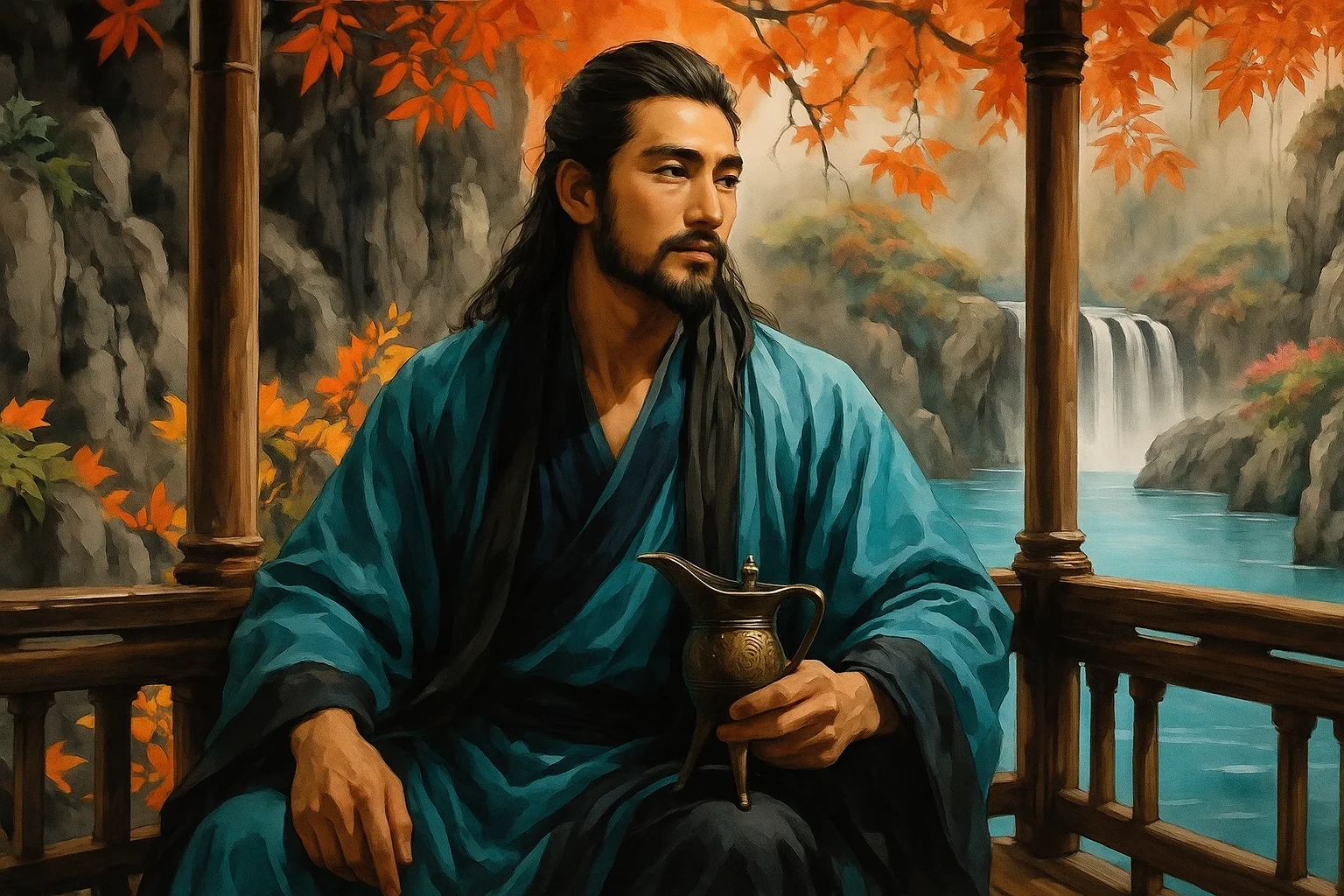
Ouyang Xiu (欧阳修, 1007 - 1072), a native of Yongfeng, Jizhou (present-day Jiangxi Province), emerged as the preeminent literary figure of the Northern Song Dynasty. After attaining the jinshi degree in 1030, he spearheaded a literary reform movement that rejected the ornate Xikun style prevalent at court. As a mentor who nurtured literary giants like Su Shi and Zeng Gong, he laid the foundation for the golden age of Northern Song literature. Recognized as one of the "Eight Great Prose Masters of Tang and Song," Ouyang stands as the pivotal figure in the transformation of Northern Song literary culture.






